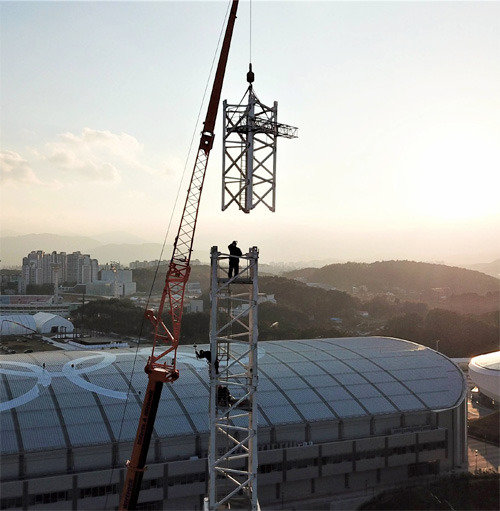Viewers around the world to experience first ‘VR Olympics’
Viewers around the world to experience first ‘VR Olympics’
Posted January. 10, 2018 08:44,
Updated January. 10, 2018 09:23

The International Broadcasting Centre (IBC), which will become the eyes for the world during the 2018 PyeongChang Winter Olympics, opened the main media working space in PyeongChang in this year’s Olympic venue on Tuesday. The Olympic Broadcasting Service (OBS) under the International Olympic Committee (IOC) started installing broadcasting equipment of companies with broadcasting rights amidst the cutting wind of Daegwallyeong from Nov. 1 last year and is now ready to greet 86 broadcasters around the globe with the right to broadcast the winter games.
Approximately 50 percent of the profit the IOC gains from holding the Olympics comes from the royalty broadcasting companies. Accordingly, a successful Olympics is closely related to successful broadcasting. The IOC has already made record high profit of 4.5 billion U.S. dollars (about 4,806 billion won) from 2017 to 2020 (the right to broadcast is a long-term contract of four years, bundling up the summer and winter games as one) by selling the right to broadcast the Olympic Games.
The OBS, which is in general control of broadcasting the Olympics, will operate the entire process of constructing the IBC, where broadcasting companies gather from all over the world, to filming the games, broadcasting, and dissolving the IBC after the games. The organizational committee of the country hosting the Olympic Games took the role of the main broadcaster until the OBS was established. With the establishment of an official OBS in 2001, the financial burden upon the hosting country has been alleviated. The OBS provides the broadcasting of every single game and awards ceremony to companies with broadcasting rights, and these companies deliver the games to viewers around the world. The PyeongChang Winter Olympic Games will be broadcasted to 220 countries worldwide.
Then, how will the PyeongChang Winter Olympic Games present itself to viewers around the globe? We asked OBS Chief Executive Officer Yiannis Exarchos via email.
- Who will be attending the PyeongChang Winter Olympic Games and how many are coming?
“The OBS is comprised of 162 permanent employees from 32 countries. Employees of OBS experienced six Olympics on average and are experts in this field. During the Olympics period, we additionally hire best freelance broadcasters with ample experience. They are usually experts in the field of engineering, producing, freights, support for broadcasting and information. As of November 2017, OBS has a plan to dispatch 4,325 people in total to Pyeongchang. Seven hundred Korean college students who were selected in the Broadcasting Training Program (BTS) are also included in this number. BTS is a program that started with a goal to leave a broadcasting legacy of OBS in the host country. Students who were selected by cooperating with a few universities of the host country will have an opportunity to see and learn how the world’s biggest broadcasting is carried out. Selected students will be on the scene as audio or camera assistant and contact point. Of course, they are paid. Employees will be staying at the media village and adjacent hotels provided by the organizational committee.”
Companies with the broadcasting rights from each country also plays a role as main broadcaster for the games as there is a limit for OBS to broadcast the entire games. Korean broadcasting companies will act as a main broadcaster taking the role of OBS for short track games of South Korea, the sport's traditional powerhouse.
―What are the characteristics of Pyeongchang IBC?
“Pyeongchang IBC, located on the opposite side of Alpensia Resort, is the first IBC located in the mountains in the Olympic history. In the previous Winter Olympic Games, the IBCs were always located in beaches, downtown, or near the ice rink. Under the motto of ‘a sustainable Olympics,’ OBS reutilized the module that was used for the production of the IBC of the Rio de Janeiro Olympic Games. Including the self-assembly type panels, it prevented formation of 50,000 m³ of waste.”
―How will the PyeongChang Olympics be different from previous airings?
“For the first time ever in the history of the Winter Olympic Games, viewers from all over the world can watch the Olympic Games in high-definition virtual reality (VR). Along with the VR airing, OBS plans to produce the panorama screen, which shows a wider view, and sell it to the airing companies. During the PyeongChang Olympic Games, at least 55-hour VR live airing will be delivered across the world. VR airing can be watched through the Samsung Galaxy Gear VR, Daydream, Windows Mixed Reality, iOS, Android, the Internet and social media.”
―How will OBS react to rising demand for social network services?
“The development of digital platforms and technology made innovative changes to the viewing of sports games. The importance on contents, rather than airing hours or the number of airing cameras, is being emphasized. The key point of the digital era is storytelling. Walking on the same track with the change within viewers connected by the social network services, OBS is also aiming to bring the young generation into the group of key consumers of watching sports games. In order to do so, OBS will also provide additional materials and data that the airing companies will utilize for social media services. These materials and data include data analysis, various angles, super slow motion and 360-degree replay technology. Olympic Video Player (OVP), which was released during the Sochi Winter Olympic Games, will be also provided. This service allows viewers to watch live on-air games and games of their choice on computers, tablet computers and smartphones.”
―You have been airing so many Olympic Games. What was the most memorable moment?
“If we have to choose only one, it would be the first Refugee Olympic Team of the 2016 Rio Olympic Games. The refugee team showed an amazing energy countering difficulties and made the impossible possible in front of world viewers, illustrating the spirit of the Games.”
―What does OBS look forward to the most about the PyeongChang Winter Olympics?
“We wish we can deliver the beautiful scenery, culture, and people of Korea to everyone all over the world. Furthermore, even though the international situations are chaotic at this moment, we hope that the PyeongChang Winter Olympic Games can ruminate on the power of sports in order to bring peace to the world.”
Bo-Mi Im bom@donga.com
Headline News
- Israel prepares for retaliation against Iran
- Samsung reclaims top spot, surpassing Apple in smartphone market
- 77% of Koreans in 20s and 30s are 'Kangaroo Tribe' due to job crisis
- KBO referees embroiled in controversy over ABS decision concealment
- Inflation, oil price surge put double shock on global economy







